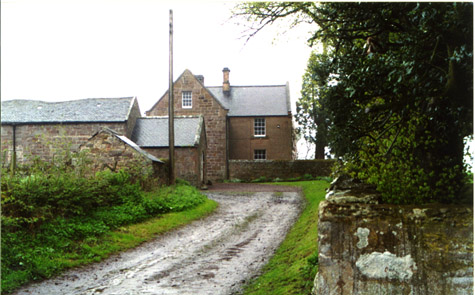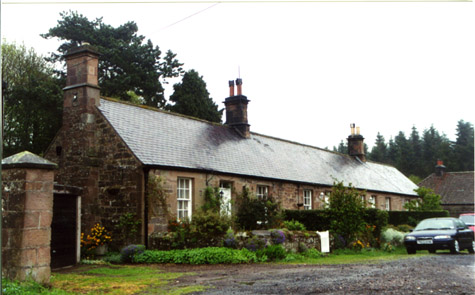

Elliott, Bruce, 2004-2005: Emigrant Recruitment by the New Brunswick Land
Company: The Pioneer Settlers of Stanley and Harvey.********************************************************************************
Medium sized pop up image
700 X 435, 72 dpi, 142 kFull sized pop up image
2407 X 1495, 400 dpi, 2208 kFowberry Mains, Chatton parish, east of Wooler, Northumberland, typical of the farmhouses on the large farms in the district. Harvey settler John Cockburn worked on this farm in 1834. Source: Bruce S. Elliott, 2002.
Hinds were taken on each March at annual hiring fairs in the market towns, and received grain, peas, potatoes, coals, and money in addition to the tied cottage. (48)
The 1830s was a period of growing agricultural distress, though not attended in the Borders with the level of violence and incendiarism that alarmed the south of England in the same period. (49) In March 1835 and again in February 1836 meetings of proprietors and occupiers of land were convened in the market town of Wooler to petition Parliament for an official inquiry into the causes of the agrarian malaise besetting the kingdom. The immediate cause of distress was perceived locally to be "the progressive depreciation of prices ... bitterly ruinous to themselves and their families". (50) Rents, on the other hand, had not declined from the high levels attained during the prosperous years of the Napoleonic Wars.(51)
Medium sized pop up image
700 X 435, 72 dpi, 118 kFull sized pop up image
2407 X 1495, 400 dpi, 1690 kRow of former hind's cottages near Fowberry Bridge. The Cockburns would have lived in a similar row while working at Fowberry Mains. Source: Bruce S. Elliott, 2002.
The declining incomes of the farmers of course impacted negatively upon their ability to maintain labourers' wages. In December 1836 nearly 300 hinds from the Wooler district met at the Anchor Inn to seek improvements in their conditions of service. Their weekly wages did not exceed seven shillings, "a very inadequate remuneration for the labour of this valuable class of men". They complained also of the traditional requirement that they provide the farmer with a young woman known as a bondager. The hind found her bed and board and paid her a wage, in return for which he retained the daily earnings from her field work. The intent of the system was that the hind and his family would clear a small profit from making the bondager's labour available to the farmer, but the earnings of female day labour had sunk to 8d, entailing a loss of as much as 30s. to a hind over the course of a year. (52) It is small wonder that the hinds were enticed by the prospect of emigrating to a colony where labour was scarce and remunerated sufficiently that farm ownership became an early prospect. Though the Company party may have come with little or no capital, they were expected to repay the passage money advanced to them within three years, and to rent or purchase lands from the Company.
_________________________________________________________________________
(48) Berwick Advertiser, 4 March 1843, p. 4, col. 7 and 11 March 1843, p. 4, col. 2; Second Statistical Accounts for Cockburnspath and Roxburgh parishes, stat-acc-scot.edina.ac.uk.
(49) The Berwick Advertiser attributed the relative peace of the Borders to "that education, literary and religious, which is afforded to the lower classes": 10 October 1835, p. 4, col. 1.
(50) Berwick Advertiser, 21 March 1835, p. 1, col. 2; 27 February 1836, p. 4, col. 3. The average price of wheat had declined from 64s 3d to 36s per quarter since 1830: ibid., 6 February 1836, p. 1, col. 6.
(51) J.S. Donaldson, "To the Agriculturists of North Northumberland", Berwick Advertiser, 20 February 1836, p. 1, col. 5.
(52) Berwick Advertiser, 17 December 1836, p. 4, col. 4.

